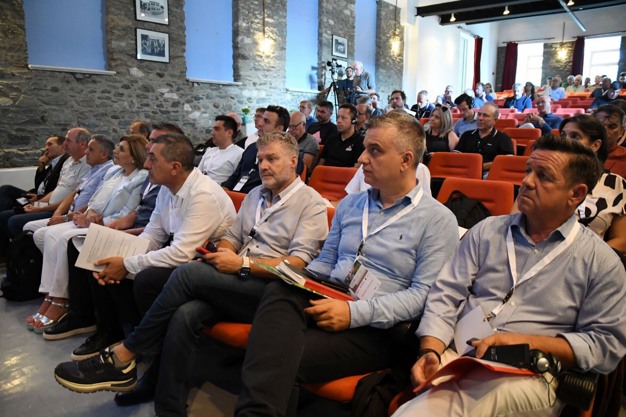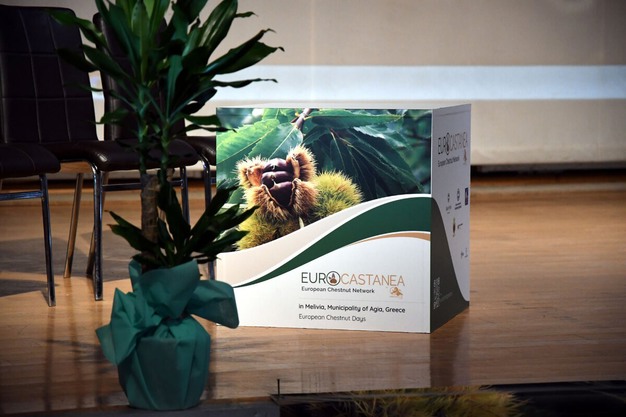Approximately 22.000 tons are expected for the new Greek chestnut crop, representing a 30% reduction compared to the last 8-year average, according to the forecast announced on Friday, September 13th, at EuroCastanea 2024. This year the event took place in Agia-Melivia, Greece, hosted by the Agricultural Cooperative of Melivia. The forecast was presented by Mr. Stephanos Diamandis, Research Director of the Greek Forest Research Institute and member of HAA.
The estimation is based on data collected until the end of August but as Mr. Diamandis commented on Monday, September 16th, it is possible to see a slightly greater decrease in Peloponnese and Thessaly due to last-minute rainfalls, whose repercussions have not yet been measured.

Photo provided by choraagia.gr
Mr. Diamandis states: "Τhis year, the weather seems to be a worse drawback factor than any disease and insect infestation. A heat wave in June, with temperatures climbing up to 37-40ᵒC, had a negative effect on the trees, at least at the lower elevations. In addition, the following extreme drought, almost all over Greece, is expected to result in a lower production of chestnuts."
The crop estimation per region
According to the data presented at EUROCASTANEA 2024, the forecasted new crop is divided per region as follows:
Crete: 875 t. (-30%)
Peloponnese: 4.760 t. (-30%) *Estimation before last-minute rainfalls.
Central Greece: 3.150 t. (-30%)
Epirus: 1.800 t. (-40%)
Thessaly: 3.600 t. (-40%) *Estimation before last-minute rainfalls.
Western Macedonia: 1.750 t. (-30%)
Central Macedonia: 4.000 t. (-20%)
East Macedonia & Thrace: 2.086 t. (-30%)
Market prospects
Mr. Diamandis estimates that "the reduced production which is expected this year will increase the wholesale and retail prices. The latter is not a positive development for Greece, as one of the targets of our agricultural policy is to increase the per capita chestnut consumption. In the last 5-8 years the price of chestnuts has already increased remarkably which kept the domestic consumption low." As for the nut's quality, he stresses that "it will depend on the climatic conditions until harvesting. Usually, rains in September, after a long dry summer are a crucial cause of split nuts."
The challenges faced by the Greek chestnut sector
Mr. Diamandis also proceeded with a thorough description of the Greek chestnut sector. According to what he said: "Major weaknesses of the Greek chestnut cultivation are the abandoned and over aged orchards and the poor nut processing. Greece needs a national plan and funding for the replacement of low productivity trees over the next 10 years. The national production could increase by at least 40%. Also, in view of starting wide scale chestnut processing, the industry will need new suitable varieties."
There are also new problems added to the list, that make chestnut growers in Greece wonder whether to continue cultivating chestnuts or to stop completely. Mr. Diamandis counts among these reasons: "The climatic crisis, Ink disease, chestnut wasp and the Brown rot of nuts, which bother growers and also scientists, who are trying to find solutions."

As for the battle against ink disease, Mr. Diamandis says there are positive results coming from the use of Potassium phosphite, which reduces the tree loss.
There is also hope coming from the massive release of Torymus sinensis against chestnut wasp. "In many areas there is obvious decline of the wasp population increasing not only the yield, but also the morale of the producers," observes Mr. Diamandis and notes that "although the wasp population is in decline, it still has an impact on the national yield. The fact that the wasp population is in decline gives hope that the rot incidence will also be declining from year to year."
There is also fight against brown rot. "As in other EuroCastanea countries, last year in Greece brown rot was devastating. This year, in May and June, producers used fungicides with active ingredient Tebuconazole, according to the protocol sent by a team of experts based on Vannini et al. 2021. We are anxious to evaluate the results this autumn after harvesting." stresses Mr. Diamandis.
For more information
Stephanos Diamandis
Greek Forest Research Institute
Tel: +30 69325 84607
[email protected]
